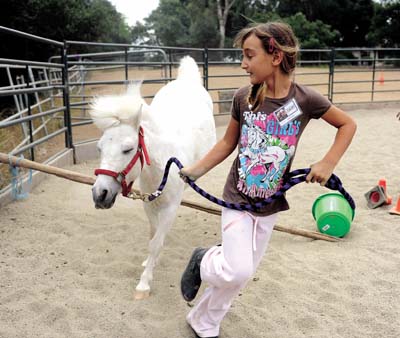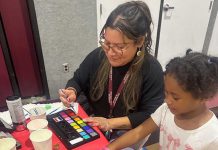
Little Ava Childers’ blond pigtails toss around shoulders, her
riding helmet latched beneath her chin. Kathy Hobbs, her grandma
whom Ava lives with in Prunedale, takes photos while Ava, 8, sits
on a brown and white spotted horse named Captain Bingo in the shade
of the barn on New Avenue in San Martin last Wednesday. It’s the
third day of the IBM/DreamPower Camp for children on the autism
spectrum
– and for Ava
”
this is it
”
Hobbs said.
Little Ava Childers’ blond pigtails toss around shoulders, her riding helmet latched beneath her chin. Kathy Hobbs, her grandma whom Ava lives with in Prunedale, takes photos while Ava, 8, sits on a brown and white spotted horse named Captain Bingo in the shade of the barn on New Avenue in San Martin last Wednesday. It’s the third day of the IBM/DreamPower Camp for children on the autism spectrum – and for Ava “this is it” Hobbs said.
“When Ava came here (three summers ago) she was very, very nonverbal and now her language skills have increased. Even though she only comes once a year, it has an impact for her. This is like the highlight of her entire year. Every time we talk about it … her face just lights up,” Hobbs said.
Ava’s smile permeated the barn and the four volunteers who walked with the horse as she rode smiled and laughed at Ava’s uninhibited joy. She was riding a horse, and she couldn’t be happier.
“I’m amazed she’s actually doing the rings this year,” Hobbs said smiling about working on her coordination while riding. “And getting the opportunity to interact with other kids because that’s her biggest challenge is social interaction. This year she has been saying ‘hi’ to some of the kids in camp and giving high-fives. So it’s just a wonderful opportunity. She just loves horses and this her chance once a year to do this. The impact is long-lasting.”
At the second of two week-long camps this year for children with special needs, the nonprofit organization that uses horses for therapy – a unique take on traditional, office-setting psychiatry (and incorporates physical therapy) – DreamPower served 16 campers ages 4 to 13 who have autism. Observing, touching, riding and developing a relationship with a horse helps special-needs children respond to body movements, use a tone of voice that is calm and assertive while also deserting the tendency toward aggressive or anxious behaviors. The lesson of empathy is as important, too.
From children who are high-functioning to totally non-verbal, the therapy is effective, says DreamPower founder, director and sole employee Martha McNiel. The families of the children will corroborate that testament, as will the 250 or so volunteers the equine therapy program draws each year.
Terri Stinson, a volunteer who raises about one-third of needed funds each year according to fellow volunteer Julie Whelan, is constantly amazed by the generosity of people in the community. While watching a child atop a horse throw a ball to a horse handler, Stinson beamed. “That man over there, he’s visiting his daughter on vacation and she works for IBM. He took time from his vacation to volunteer here. He came to me and handed me a check for $100 and said, ‘it’s not much, but what you’re doing here is amazing.'”
This was the first camp focused on children with autism at DreamPower, and Silicon Valley’s IBM office took notice. As part of their 100th birthday celebration, IBM and its employees have been donating and volunteering even more than usual. At DreamPower, Jai Menon an IBM fellow and chief technical officer along with fellow IBM employees turned in their suits and ties for dusty jeans and boots at the stables.
“IBM is very glad to support this and the people, that’s sort of the key part that makes it special for us,” he said. “There’s people taking vacation just to come here and do this and that’s amazing if you think of it. It’s really ingrained in the IBM DNA and the culture,” he said.
IBM underwrote $5,000 to the camp so McNiel could keep it affordable for all families; $150 per child for the week. McNiel said a comparable camp without volunteers and financial support is close to $1,000 per child for the week. “Horses are expensive not just to buy, but to maintain. Food, veterinary bills, it adds up,” she said.
Menon said IBM’s support of DreamPower will continue and McNiel was thrilled about the feedback from about a third of IBM volunteers who expressed interest in volunteering on a regular basis.
Morgan Hill Mayor Steve Tate, an IBM employee for 38 years, isn’t much of a cowboy – though he does love Westerns, he said. He came by DreamPower horsemanship Wednesday to volunteer.
“When you see the kids and the horses working together it’s neat. It’s fantastic,” Tate said. He said the economy is hard on nonprofit groups like DreamPower which need as much community support as possible, especially now.
The therapy isn’t limited to horses (there are goats, chickens, dogs, mini horses and cats) nor is it limited to children. The volunteer team of licensed counselors, therapists and teachers along with volunteers suited to care for the animals provide therapy to veterans from the wars in Iraq and Afghanistan to at-risk teens in group homes. With a population that may be resistant to communicating in an office or one-on-one with an adult, horse therapy has given new angle to “opening up.”
Longtime volunteer and experienced rider Garry Stauber works with the Horses for Heroes program at DreamPower and with at-risk teens. Though Stauber had several anecdotes that manifests the effect of combining riding with therapy, one story stuck out Wednesday.
Stauber recalled the first day he was working with a particular veteran of the Global War on Terror and the veteran began to talk about witnessing his friend die in battle. The story continued for some time, until the man asked Stauber, “so when does the therapy begin?” Stauber laughed, “He was opening up about this, about his buddy dying in the war. This was therapy. It was happening and it was happening because he was on a horse.”









